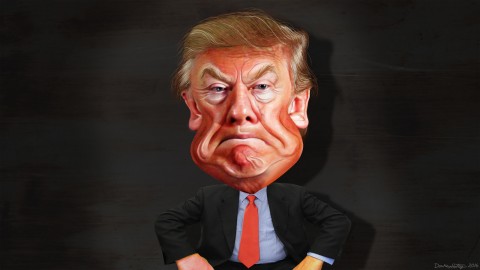Jazz Corner: Freedom & Democracy
Just as democracy affords the citizens to freely choose their leader and thus their future, jazz allows the musicians involved in its creation the opportunity, scope and freedom to create the music they choose.

Isn’t it supremely ironical then that this completely ”˜free’ and democratic music has come from the reprehensible slave trade in the US? Art by Flickr user DonkeyHotey
The Americans are all agog with anticipation of the future of their nation with the Presidential elections around the corner. They must be wondering where either candidate will take them. An exuberant, radical Donald Trump, an unknown political entity, might take the country veering off to the right while the first-time woman Presidential candidate, Hillary Clinton is offering the voters a novel choice into the unknown. That is the beauty and the value of democracy and freedom. “A people always get the politicians they deserve,” except in this case they have the right to choose their leader.
In many ways, I feel that the greatest symbol of the freedom and democracy in the US, even beyond their political system, is jazz music. Just as democracy affords the citizens to freely choose their leader and thus their future, jazz allows the musicians involved in its creation the opportunity, scope and freedom to create the music they choose. Jazz is the ultimate freedom! In a (Western) classical performance, the music is composed, rehearsed and performed exactly as ”˜required’ by the script. At another level, in popular music, it is the songwriter/ lyricist who have pre-ordained how the song is to be rendered. But in jazz, the performer is the master. He has the freedom to take a melody/composition into directions and realms of his own choice, often into areas where his mood and inspiration of the moment take him. In a typical performance””live or studio”” the chosen piece is represented in the beginning as the ”˜head’ and is usually followed by individual solos by the musicians in the band. The scale and length of the improvised solos too are not pre-set. Thus any rendition of a particular song is unique and unlikely to be ever repeated in the same way twice. That unique ”˜fingerprint’ quality of each version is what excites most jazz aficionados.
Isn’t it supremely ironical then that this completely ”˜free’ and democratic music has come from the reprehensible slave trade in the US? The history of jazz tells us that the blues, the mother lode from which jazz (and rock&roll) has emerged, is the vocal music the slave community indulged in to communicate with each other while they worked in the cotton fields. The blues actually are a means of ridding oneself of the suffering (blues), thus finding an expression of freedom and spiritual liberation. Now, the blues may be the exclusive creation of the African American, and jazz may be also uniquely from the land of the free; however, I feel that jazz and the blues are essentially Indian and have somehow been reincarnated in the USA.
In a jazz performance, one starts with a known starting point and there is obviously a conclusion. In between there is improvisation. Now, is this any different from traffic in India? We always know our starting point and we know where we need to get to. In between there is 100 percent improvisation. Why, even a few horn solos are thrown in as are drum rolls by way of motorcycles with faulty silencers and auto rickshaws! We have been like this longer than the entire history of the US. Our ”˜street jazz’ has existed for a very, very long time. We are also the world’s largest democracy. Now I hope the Americans choose well in November.



